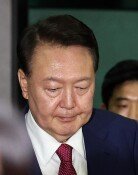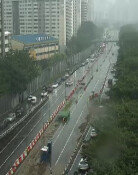[Editorial] Where is the New Idea on the Security of Northern Seoul?
[Editorial] Where is the New Idea on the Security of Northern Seoul?
Posted January. 18, 2004 23:33,
All U.S. troops stationed in Yongsan, north of Seoul, including the Combined Forces Command (CFC) and the United Nations Command (UNC) will relocate to south of Seoul. As President Roh Moo-hyun responded positively to the U.S. strong demand for realignment by saying that keeping Yongsan as the U.S. military station is an outdated way of thinking, at least a form of agreement between the two countries seems to be prepared. It is also significant that Seoul, as the capital, will be free from any station of foreign troops for the first time in 122 years. However, the nations security is still worrying for simply welcoming this.
Accordingly, it is the pressing need to ease security unrest raised by the complete withdrawal of U.S. forces north of Seoul. It is quite natural for Korean people to feel unrest considering the fact that the nation is confronting with North Korea without ending a cease-fire and that Seoul is within range of the Norths long-range missiles. Negative effects on the economy, such as a decline in foreign investment, will not be less than that. For these concerns, we argued in this column that the CFC and the UNC should remain in Seoul as a symbolic deterrent.
The U.S. emphasizes that a deterrent to North Korea would not be weakened with the relocation. It states that its military capacity will instead increase as it carries out the realignment as part of its overall troop-relocation plan abroad. However, many Koreans are in great anxiety, including 133 lawmakers who object to the relocation. The U.S. should relieve this anxiety not by words but through action.
Meanwhile, the Korean government should be fully prepared next measures from now on even if it has shown an inconsistent position without principles at the negotiation table with the U.S. Last year, Prime Minister Goh Kun claimed maintenance of trip wire with the U.S. troops as one of three principles on the U.S. forces relocation, but he did not stick to it. In addition, the government ended to agree with the realignment after pestering the U.S. on the remaining size of Yongsan. Doesnt it clearly show the governments lack of preparation and absence of negotiating power?
Mr. Roh should make clear what the new idea is to guarantee the nations future security. It is not the U.S. but the Korean governments responsibility to relax the peoples attention on the matter of security.






![[단독]尹 “들여보내지 말라니까”…경호본부장 “관저 2정문 뚫리면 소총들고 나가라”](https://dimg.donga.com/c/138/175/90/1/wps/NEWS/IMAGE/2025/07/07/131931090.1.jpg)
